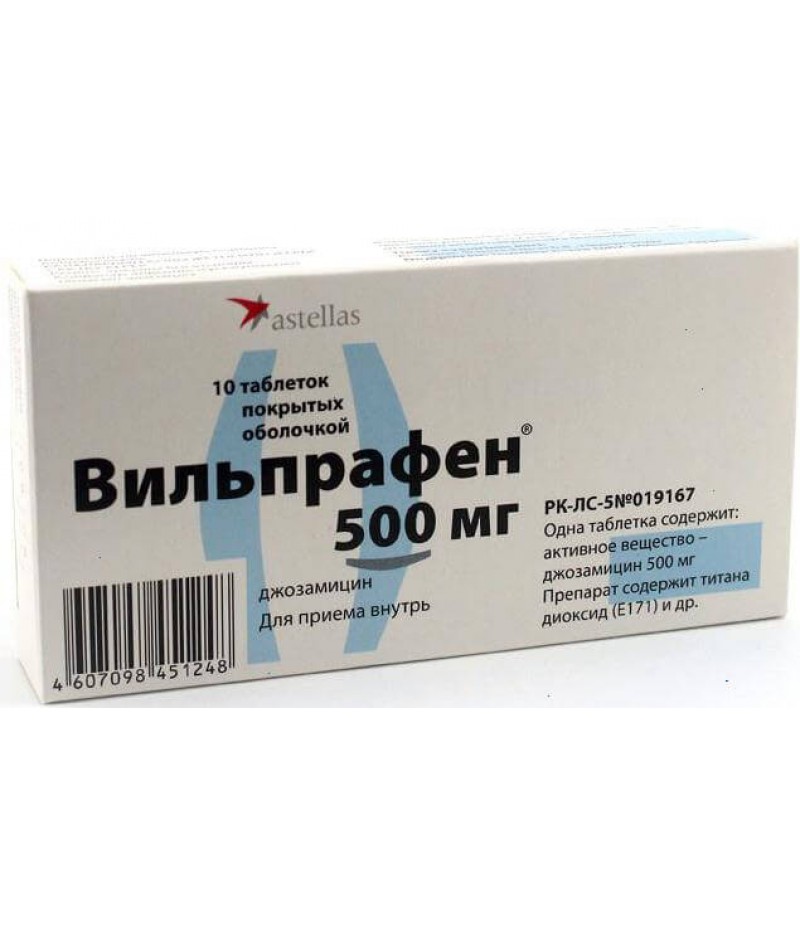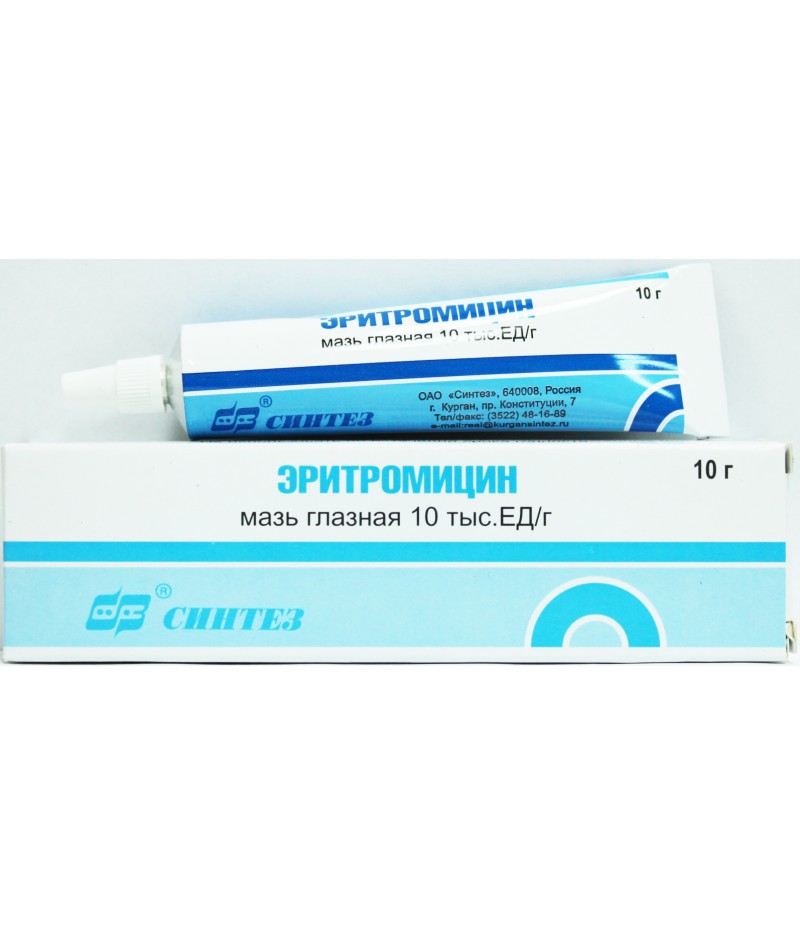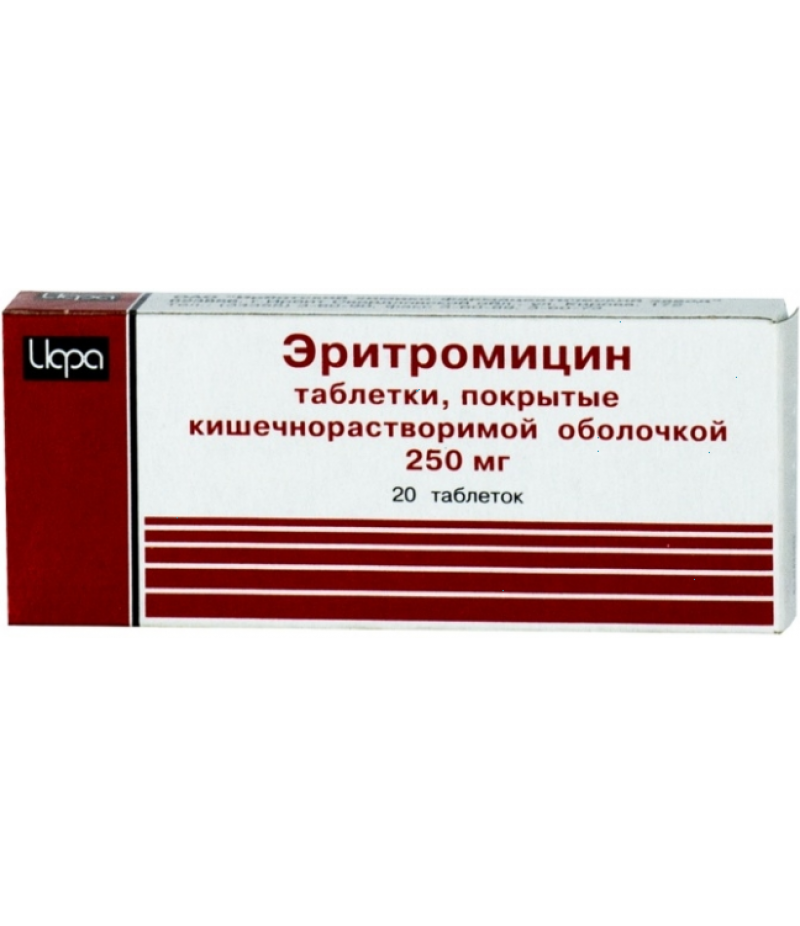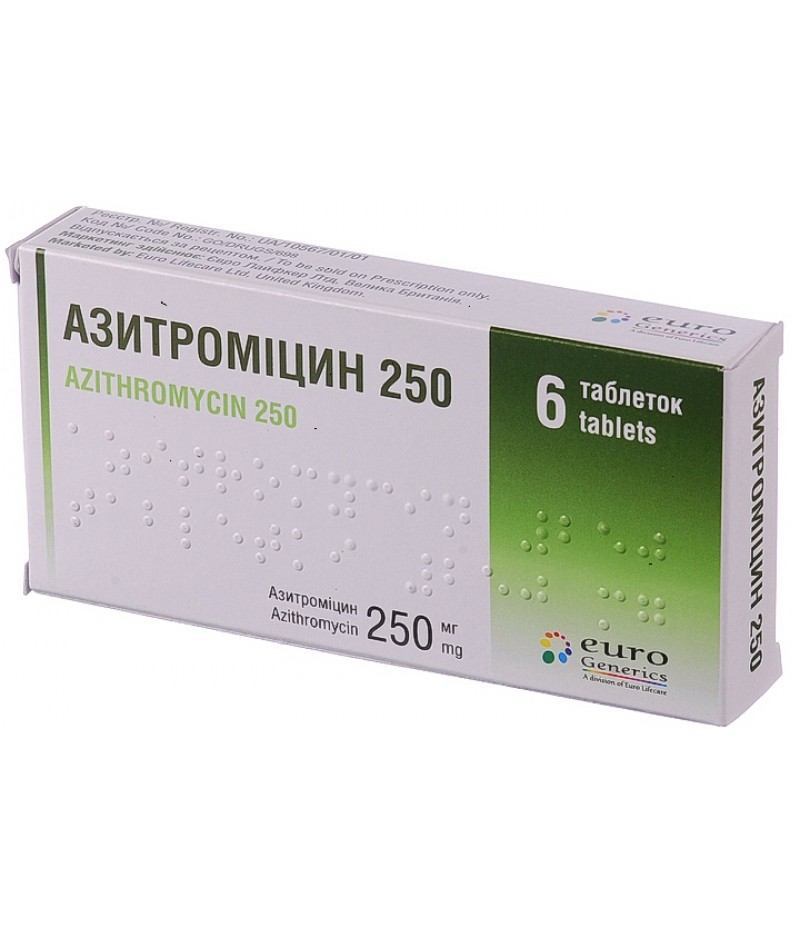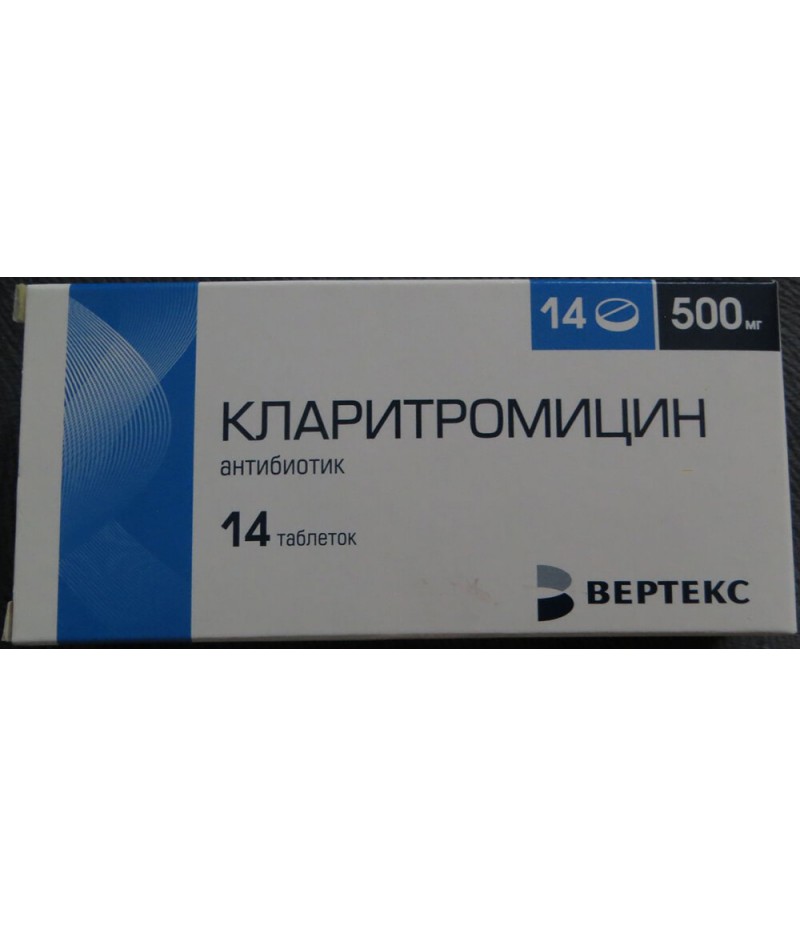Wilprafen tabs 1000mg #10
- $31.35
- 3 or more $29.99
- Availability:In Stock
Wilprafen instructionYou can buy antibiotic Wilprafen on this pageCompositionThe composition of Wilprafen is as follows: one tablet contains 500 mg of josamycin; The suspension (10 ml) contains ..
Tags: tabs
Wilprafen instruction
You can buy antibiotic Wilprafen on this page
Composition
The composition of Wilprafen is as follows:
one tablet contains 500 mg of josamycin;
The suspension (10 ml) contains 300 mg of josamycin.
In addition, Wilprafen contains auxiliary ingredients: microcrystalline cellulose, methylcellulose, polysorbate 80, colloidal anhydrous silica, sodium carboxymethylcellulose, magnesium stearate, talc, titanium dioxide (E171), macrogol 6000, poly (ethacrylate methyl methacrylate) -30%, aluminum hydroxide.
Form of issue
The preparation is in the form of film-coated tablets. In the outline cell pack contains 10 such tablets. Packing is put in a cardboard box. How many tablets in the package, so much in the pack.
Also, the preparation is available in the form of a suspension. Contained in bottles of dark glass, 100 ml in a vial. The set includes a measuring cup. Suspension in the bottle is contained in a cardboard box.
Suppositories with this active substance are also produced.
pharmachologic effect
The drug is an antibiotic that belongs to the macrolide group. The body has a bacteriostatic effect, which is due to the inhibition of protein synthesis by bacteria. If the concentration of the drug is high in the focus of the inflammatory process, it has a pronounced bactericidal effect.
High activity of the active substance is noted in relation to a number of intracellular microorganisms: Chlamydia pneumonuae, Chlamydia trachomatis, Mycoplasma hominis, Mycoplasma pneumoniae, Legionella pneumophila, Ureaplasma urealyticum. The drug also acts on Gram-positive aerobic bacteria: Streptococcus pyogenes, Staphylococcus aureus, Corynebacterium diphtheriae, Streptococcus pneumoniae (pneumococcus). Influence on Gram-negative aerobic bacteria Haemophilus influenzae, Neisseria gonorrhoeae, Bordetella pertussis, Neisseria meningitidis, as well as on some anaerobic bacteria Peptostreptococcus, Clostridium perfringens, Peptococcus.
The activity of Wilprafen in relation to Treponema pallidum is noted.
Pharmacodynamics and pharmacokinetics
After oral administration, a rapid absorption of the substance from the digestive tract is noted. The greatest concentration of the drug is achieved 1-2 hours after ingestion. After 45 minutes after taking the drug at a dose of 1 g, the average concentration of josamycin in the blood plasma is 2.41 mg / l.
The active substance binds to blood proteins by no more than 15%. If the drug is taken at an interval of 12 hours, a sufficient concentration of josamycin remains in the tissues throughout the day. After 2-4 days, the balance of its content is reached.
Josamycin is able to easily penetrate through membranes. It accumulates in the lymphatic, pulmonary tissue, in the palatine tonsils, in the urinary organs, and also in soft tissues.
The highest concentration of the drug is observed in the tonsils, saliva, lungs, sweat, tear fluid.
In the liver, biotransformation of josamycin takes place, as a result of which it becomes less active metabolites.
From the body is mainly excreted with bile, with urine released less than 20% of the substance.
Indications for use
Before starting treatment, you should always consult a doctor and read the annotation, which describes what the pill is from.
Indications for use are as follows:
Infectious diseases that cause inflammation, which were caused by microorganisms with high sensitivity to the drug.
Infectious diseases of the ENT organs and upper respiratory tract (used for angina, pharyngitis, tonsillitis, sinusitis, laryngitis, average otitis media).
Infections of the lower respiratory tract (with pneumonia, acute bronchitis, whooping cough, bronchopneumonia).
Infections of the oral cavity (with periodontal diseases, gingivitis).
Infections of skin and soft tissues (with furuncles, pyoderma, lymphadenitis, etc.)
Infections of the urino-genital organs (with chlamydia, with ureaplasma, gonorrhea, urethritis, prostatitis, etc.)
It is used in the treatment of diphtheria in addition to therapy with diphtheria antitoxin.
People with hypersensitivity to penicillin are prescribed for scarlet fever.
Contraindications
You can not take the remedy in the following cases:
at hypersensitivity to antibiotics to macrolides;
with severe violations in the functions of the liver.
Side effects
The following side effects are noted when treating this agent:
In the functions of the digestive system: rarely there are manifestations of nausea, heartburn, vomiting, diarrhea. With severe persistent diarrhea, severe pseudomembranous colitis can develop due to the effect on the body of antibiotics.
Rarely develop hypersensitivity reactions: very rarely allergic reactions are observed on the skin.
In the functions of the liver and biliary tract: sometimes there is a transient increase in the activity of liver enzymes in the blood plasma, which can be accompanied by a violation of the outflow of bile, followed by jaundice.
Dose-dependent hearing impairment is rare.
Instructions for the use of Wilprafen (Method and dosage)
The antibiotic is taken as follows. Adults and adolescents who are already 14 years old, take 1-2 g of the drug in two or three doses. It is recommended to start with a dose of 1 g.
In the treatment of chlamydia, 500 mg should be taken twice a day for 12-14 days. Rosacea therapy involves taking 1000 mg of the drug, which should be divided into two divided doses per day. Treatment lasts 10 days.
Dosage, which should use tablets for a number of other diseases, determines only the attending physician, taking into account the individual characteristics of the course of the disease. But basically the course of treatment lasts not less than 10 days.
The instruction for Wilprafen Solutab provides that the drug can be taken in different ways: you can take a pill, wash it with water, or before dissolve it in 20 ml of water. The suspension, which was formed after the dissolution of the tablet, must be thoroughly mixed.
Wilprafen tablets should be swallowed whole. Often, patients are interested in how to take, before or after a meal. The instruction states that the tablets should be swallowed between the main meals.
Overdose
To date, there is no evidence of overdose and symptoms of drug poisoning. If an overdose occurs, there may be those signs that are described as side effects of the drug.
Interaction
Speaking about the interaction with other drugs, it should be borne in mind that Wilprafen is an antibiotic. Before applying any medication, it is necessary to determine whether the antibiotic is, or not.
If Wilprafen is prescribed concomitantly with antihistamines that contain terfenadine or astemizole, the process of removing these substances is sometimes slowed down, which ultimately leads to cardiac arrhythmias that are life-threatening.
With the simultaneous administration of Wilprafen with ergot alkaloids vasoconstriction may increase. Therefore, in this case, careful monitoring of the patient's condition is needed.
Simultaneous reception of josamycin and cyclosporine provokes a rise in the level of cyclosporine in the blood plasma. Also in the blood there is a nephrotoxic concentration of cyclosporine. With such treatment it is necessary to provide a constant control of the concentration in the plasma of cyclosporine.
If you simultaneously take Wilprafen and Digoxin, you can raise the level of digoxin in the blood plasma.
When taking Wilprafen with hormonal contraceptives, the effect of the latter may be reduced. In this situation, the use of additional non-hormonal contraceptives is recommended.
Storage conditions
Refers to list B. Store the medicines in a dark place, at a temperature of no more than 25 ° C. The drug should be protected from children.
Shelf life - 4 years.
special instructions
People suffering from kidney failure need to take into account the results of laboratory tests.
It is necessary to consider the possibility of resistance to various antibiotics macrolides.
Analogues
Wilprafen analogs 500 mg, having the same active substance, are not realized in pharmacies. What can replace this drug, should determine only the doctor. The substitute is selected taking into account the individual characteristics of the course of the disease.
Analogues of the drug are considered drugs that belong to the group of macrolides. This group includes erythromycin, clarithromycin, azithromycin. The price of analogues can be either higher or lower than the cost of Wilprafen. Analogues of Wilprafen Solutab are similar.
Often, patients are interested in what Wilprafen is different from Wilprafen Solutab. What is the difference between these drugs is due to their form of release. Wilprafen - these are ordinary tablets, covered with a film membrane. Wilprafen Solutab is a soluble tablet that has a sweet taste and fruity aroma. They can be taken in the form of tablets or as a suspension.
Children
Wilprafen for children under the age of 14 years is used in the form of a suspension. Wilprafen 1000 mg Soluteba can be dissolved in water to prepare a suspension. If the drug is prescribed for children, the dosage is as follows: 30-50 mg per 1 kg of body weight divided into three doses. Suspension for children up to three months of age is dosed accordingly with the exact weight of the child. Why pills are used, and whether to use them for treatment, should be consulted by a doctor.
With alcohol
If alcohol and Wilprafen are combined, then as a result, a person may have various disorders in the digestive system. Alcohol and antibiotics when combined can trigger a manifestation of hepatotoxic effects. In addition, this combination can become a starting factor for the development of cirrhosis of the liver. Even once it is not necessary to combine Wilprafen and alcohol, as when used together with alcohol, testimonials indicate that a person's health can worsen.
With antibiotics
Do not prescribe josamycin concomitantly with bacteriostatic antibiotics, since their bactericidal effect may decrease.
It is impossible to combine Wilprafen with Lincomycin, as the effectiveness of both drugs decreases.
In pregnancy and lactation
Wilprafen 500 mg and Wilprafen Solutab during pregnancy and also during lactation can be administered after the doctor carefully assesses the risks and benefits of such treatment. The doctor weighs what consequences are possible after using this drug, and only then prescribes a course of treatment. During pregnancy, Wilprafen can be used to treat chlamydia. However, if during this treatment there are side effects during pregnancy, which the instruction says, it is necessary to stop treatment. Assessing the reception of Wilprafen during pregnancy, the reviews of future mothers leave different: from positive to those where it comes to the occurrence of side effects.
Reviews of Wilprafen
Reviews about the drug and its effect on the body indicate that the drug has an effective effect, but sometimes there is a manifestation of side effects. Reviews for chlamydia, as well as for treatment for ureplasma, suggest that the symptoms of the disease disappear after a few days. As side effects, digestive disorders, allergic reactions to the skin are mentioned.
There are positive responses to Wilprafen Solutab in sinusitis and other infectious diseases. For children prescribe the drug is also often, its effectiveness is confirmed by experience. Sometimes in the reviews sometimes it comes to the fact that after the course of therapy with this medicine the child develops a dysbacteriosis.

